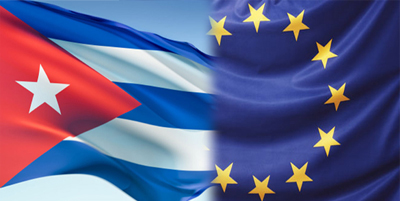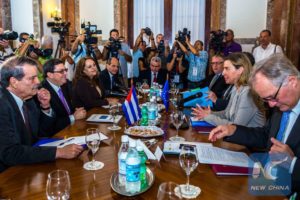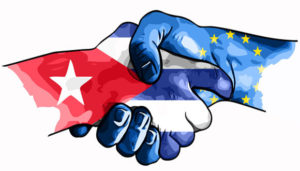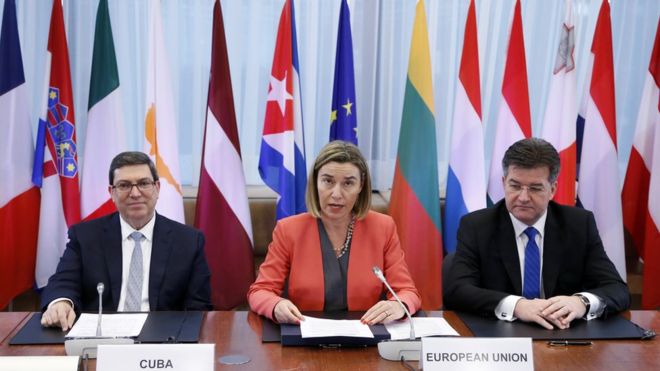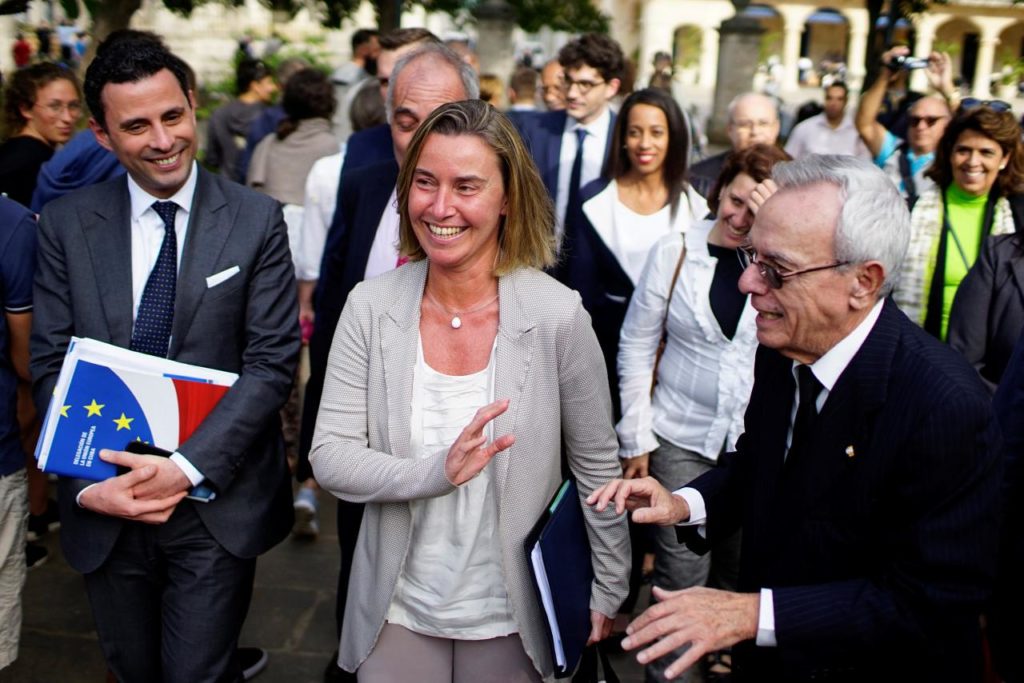The head of European diplomacy, Federica Mogherini, said on Thursday that the European Union (EU) will accompany Cuba in the imminent transition of power that will take place in the coming months and in the modernization of its economy as a “solid, reliable partner and predictable “shortly before meeting with Raúl Castro. “There are no factors that produce sudden changes in the foreign policy of the EU,” Mogherini said at a press conference in reference to the radical turnaround that the administration of Donald Trump has given in US diplomacy, which has also affected its relationship with Cuba.
Mogherini stressed that the change in power that will take place next April, when Raúl Castro leaves the presidency, will be a “historic step” for Cuba, which for the first time in almost six decades will not have a Castro at the helm of the country. process that the EU will follow “closely, with respect and attention”. “There are no factors that produce sudden changes in the foreign policy of the EU,” Mogherini said, referring to the radical turnaround of the Trump administration.
The president of Cuba finally received the head of European diplomacy to strengthen bilateral ties within the agreement of political dialogue and cooperation between the community bloc and the island. In an “atmosphere of cordiality,” the Cuban leader and the High Representative of The EU for Foreign Affairs and Security Policy noted the “favorable march” of relations between the Union and the country, according to a brief official note of the meeting.
Castro and Mogherini discussed the “development prospects” of this relationship, which received a boost after the provisional entry into force of the bilateral agreement last November, and discussed “various topics of interest to international news.”
The meeting was attended by the ambassador of the European Union in Cuba, Alberto Navarro, and the cabinet member of the High Representative, Enrico Petrocelli. Rodrigo Malmierca, Cuban Foreign Affairs Minister, Bruno Rodriguez, and Foreign Trade and Foreign Investment, who had already had interviews with the high official during her two-day visit to Havana, also attended.
Raúl Castro will leave the presidency next April – two months later than initially expected due to the ravages of Hurricane Irma, charge that will foreseeably inherit the first vice president Miguel Diaz-Canel, who has opted for a continuation line in the Cuban socialist model.
The Italian diplomat, who ended her two-day visit to the island, said that this political change comes at a time when Cuba and the EU have raised the level of their exchanges and already have their first agreement on political dialogue and cooperation, signed in 2016. These exchanges have also focused on the issue of human rights, a dialogue that has been carried out without impositions and in a respectful manner, which has allowed the different points of view to be addressed in a “frank and open, “he said.
The Italian diplomat said that the dialogue on the issue of human rights has been carried out without impositions and in a respectful manner, to address the different points of view in a “frank and open” manner.
One of the first tangible examples of this “new chapter” in Cuba-EU relations is the implementation of a joint program for the use of renewable energy on the island, with European funds worth 18 million euros, and another for the development of sustainable agriculture, for 21 million euros. The high official also called for closer cooperation in areas such as culture, since 2018 is the European Year of Cultural Heritage, and with a view to 2019, when Havana will celebrate the 500th anniversary of the founding of the city.
Mogherini stressed that the EU is the main foreign investor in the Island and is already its first commercial partner (after the fall of trade with China in the second half of 2017), with an exchange that reached 2,450 million euros in 2016, in addition of being the second issuer of tourists behind Canada.
The High Representative of the EU met hours before with Foreign Minister Bruno Rodríguez, with whom he discussed how to implement the agreement, a matter that will also be discussed in the first EU-Cuba Council, the mechanism of bilateral contacts that they will maintain under that legal framework, which will take place in Brussels on February 28th.
In order to continue deepening economic relations, Mogherini said that at the end of January a delegation from the European Investment Bank (EIB) will visit the island, interested in investing in Cuba and offering loans under advantageous conditions, with low interest rates and different currencies.
During her visit, the High Representative of the EU for Foreign Affairs also met with the Foreign Trade and Foreign Investment ministers, Rodrigo Malmierca; and Culture, Abel Prieto.
(OPINIÓN)LA UNIÓN EUROPEA ASEGURA SERÁ UN SOCIO “SOLIDO Y CONFIABLE” PARA CUBA EN LA TRANSICIÓN DE PODER.
La jefa de la diplomacia europea, Federica Mogherini, aseguró este jueves que la Unión Europea (UE) acompañará a Cuba en la inminente transición de poder que tendrá lugar en los próximos meses y en la modernización de su economía como un “socio sólido, confiable y predecible” poco antes de reunirse con Raúl Castro. “No hay factores que produzcan cambios repentinos en la política exterior de la UE”, señaló Mogherini en rueda de prensa en referencia al giro radical que la administración de Donald Trump ha dado en la diplomacia de Estados Unidos, lo que también ha afectado a su relación con Cuba.
Mogherini destacó que el relevo en el poder que ocurrirá el próximo abril, cuando Raúl Castro abandone la presidencia, será un “paso histórico” para Cuba -que por primera vez en casi seis décadas no tendrá a un Castro al frente del país-, un proceso que la UE seguirá “de cerca, con respeto y atención”. “No hay factores que produzcan cambios repentinos en la política exterior de la UE”, señaló Mogherini en referencia al giro radical de la administración Trump.
El presidente de Cuba recibió a la jefa de la diplomacia europea finalmente para reforzar los vínculos bilaterales dentro del acuerdo de diálogo político y cooperación entre el bloque comunitario y la Isla. En un “ambiente de cordialidad”, el mandatario cubano y la Alta Representante de la UE para Asuntos Exteriores y Política de Seguridad constataron la “marcha favorable” de las relaciones entre la Unión y el país, según una breve nota oficial del encuentro.
Castro y Mogherini abordaron las “perspectivas de desarrollo” de esta relación, que recibió un impulso tras la entrada en vigor provisional del acuerdo bilateral en noviembre pasado, y conversaron sobre “diversos temas de interés de la actualidad internacional”.
En la reunión participaron el embajador de la Unión Europea en Cuba, Alberto Navarro, y el miembro del gabinete de la Alta Representante, Enrico Petrocelli. También asistieron los ministros cubanos de Relaciones Exteriores, Bruno Rodríguez, y de Comercio Exterior y la Inversión Extranjera, Rodrigo Malmierca, quienes ya sostuvieron sendas entrevistas con la alta funcionaria durante su visita de dos días a La Habana.
Raúl Castro dejará en abril próximo la presidencia -dos meses después de lo previsto inicialmente debido a los estragos del huracán Irma, cargo que previsiblemente heredará el primer vicepresidente Miguel Díaz-Canel, quien ha apostado por una línea continuista en el modelo socialista cubano.
La diplomática italiana, que finalizaba su visita de dos días a la Isla, señaló que ese cambio político se produce en un momento en el que Cuba y la UE han elevado el nivel de sus intercambios y ya cuentan con su primer acuerdo de diálogo político y cooperación, rubricado en 2016. Esos intercambios también se han centrado en el tema de los derechos humanos, un diálogo que se ha llevado a cabo sin imposiciones y de manera respetuosa, lo que ha permitido abordar los diferentes puntos de vista de manera “franca y abierta”, sostuvo.
La diplomática italiana sostuvo que el diálogo en el tema de los derechos humanos se ha llevado a cabo sin imposiciones y de manera respetuosa, para abordar los diferentes puntos de vista de manera “franca y abierta”
Uno de los primeros ejemplos tangibles de este “nuevo capítulo” en las relaciones Cuba-UE es la puesta en marcha de un programa conjunto para el uso de energías renovables en la Isla, con fondos europeos por valor de 18 millones de euros, y otro para el desarrollo de la agricultura sostenible, por 21 millones de euros. La alta funcionaria también abogó por estrechar la cooperación en áreas como la cultura, ya que 2018 es el Año Europeo del Patrimonio Cultural, y con vistas a 2019, cuando La Habana celebrará el 500 aniversario de la fundación de la ciudad.
Mogherini subrayó que la UE es el principal inversor extranjero en la Isla y es ya su primer socio comercial (tras la caída del comercio con China en el segundo semestre de 2017), con un intercambio que alcanzó los 2.450 millones de euros en 2016, además de ser el segundo emisor de turistas detrás de Canadá.
La Alta Representante de la UE se reunió horas antes con el canciller, Bruno Rodríguez, con quien abordó cómo implementar el acuerdo, asunto que también tratarán en el primer consejo UE-Cuba, el mecanismo de contactos bilaterales que mantendrán bajo ese marco legal, que tendrá lugar en Bruselas el próximo 28 de febrero.
Para seguir profundizando en las relaciones económicas, Mogherini adelantó que a finales de enero visitará la Isla una delegación del Banco Europeo de Inversiones (BEI), interesado en invertir en Cuba y que ofrece prestamos en condiciones ventajosas, con bajos intereses y diferentes monedas.
Durante su visita, la Alta Representante de la UE para Asuntos Exteriores se reunió también con los ministros de Comercio Exterior e Inversión Extranjera, Rodrigo Malmierca; y Cultura, Abel Prieto.
Agencies/ EFE/ 14ymedio/ Sara Gómez, La Habana/ Excerpts/ Internet Photos/ Arnoldo Varona/ TheCubanHistory.com
THE CUBAN HISTORY, HOLLYWOOD.



